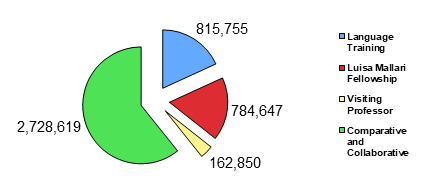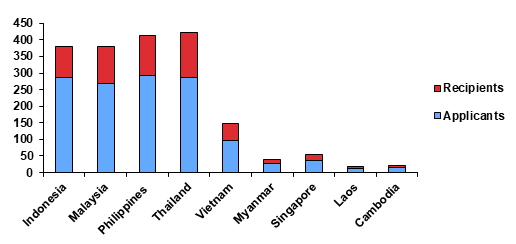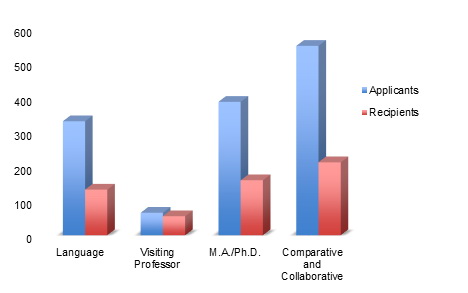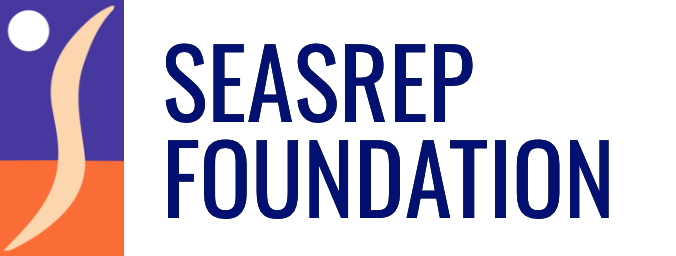The Traveling Classroom has aimed to:
SEASREP’s first traveling classroom took place in Thailand on 7-18 April 1999. The class consisted of 24 undergraduate and graduate students (six each from Malaysia, Indonesia, Thailand and the Philippines), accompanied by a faculty coordinator from each country. The theme of the class was “What Southeast Asia Means to Me.”
In its second year, the traveling classroom brought 24 students (six each from Indonesia, Malaysia, Thailand and the Philippines) to Thailand and Malaysia for 12 days (25 April to 6 May 2000). The theme was “The Impact of Tourism on Southeast Asian Societies and Cultures.” The class started in Bangkok and ended in Kuala Lumpur.
In 2001 the traveling classroom sojourned to the northern Philippines from 25 April to 6 May 2001. This time, two Cambodian students joined the group. As in the past, faculty coordinators accompanied the students. The theme of this class was “Democratization in Southeast Asia.” From Manila, the class traveled to Banaue, Bontoc, Sagada, Baguio City, Pangasinan and Pampanga.
The fourth and final traveling classroom went to Indonesia from 21 April to 2 May 2002. The class consisted of 26 graduate and undergraduate students (five each from Indonesia, Thailand, Malaysia, the Philippines, and three from Cambodia and Vietnam), accompanied by a faculty coordinator from each country. The theme this year was “Women of Southeast Asia.”
In January 2004, the traveling classroom and visiting professors programs were reconfigured to complement the Asian Emporiums course. This is an introductory course which aims to familiarize undergraduate students with the world of Monsoon Asia throughout the centuries. Lectures are expected to be of a general nature, making use of many audio-visual aids, and providing guidelines for further reading. Special lectures will be organized, dealing with specific topics such as the Dongson Culture, Sriwijaya, the Rise and Fall of Ayuthia, the English Country Trade, the Armenian Diaspora, Tharekat, Nationalism & Revolution, and Piracy in Southeast Asian Waters.
The course breaks down into six big interrelated topics (8 hours each):
View the links below to learn more:
The University of Malaya Asia-Europe Institute, the University of the Philippines Center for International Studies, and the Southeast Asian Studies Regional Exchange Program (Manila Secretariat) organized the workshop on 1-2 February 2002 at the University of the Philippines. Participated in by 15 scholars from Indonesia, Thailand, Brunei, Vietnam, Malaysia, and the Philippines, the workshop aimed:
The SEASREP initiated a Traveling Classroom Program that broadly aimed to establish linkages among selected students of the MOU universities. Specifically, the traveling classroom aimed to develop an interest in Southeast Asian studies by providing first-hand exposure to Southeast Asian culture, history and contemporary reality; enable Southeast Asian students (undergraduate and graduate) to interact with and learn from one another; and serve as the basis for future networking in the region. The traveling class is composed of 24 students and 4 faculty coordinators from Indonesia, Malaysia, the Philippines and Thailand.
On 7-18 April 1999, the first traveling classroom went to Thailand. On its second year, the traveling classroom visited Thailand and Malaysia from 26 April to 6 May 2000. For its third year, the traveling class will visit northern Philippines on 25 April to 5 May 2001.
On 8 May 2000, six Southeast Asian scholars analyzed the pre-university textbooks of Southeast Asian countries and presented a 30-page manuscript in a workshop held in Thammasat University, Bangkok. The project aimed to analyze how the pre-university textbooks (and teacher’s manuals) portray Southeast Asia.
The writers were:
From 1998-1999, the Foundation Members served as “ambassadors” of Southeast Asian studies and collaborative research. The Foundation Members traveled around the region to promote the SEASREP grants programs; assist the development of curricular programs in other Southeast Asian universities; attend regional conferences to forge new networks; and strengthen administrative arrangements within and among MOUs.
The International Conference on Southeast Asia in the 20th Century took place in University of the Philippines Diliman, Quezon City on 28-30 January 1998. The conference reviewed the developments in Southeast Asia in the last century. Six major themes were tackled: culture and societal transformation; economic development; politics, the state and civil society; women; environment, science and technology; and perspectives in the study of Southeast Asia. 93 scholars participated in the conference.
In January 2004, the traveling classroom and visiting professors programs were reconfigured to complement the Asian Emporiums course. This is an introductory course which aims to familiarize undergraduate students with the world of Monsoon Asia throughout the centuries.
Lectures are expected to be of a general nature, making use of many audio-visual aids, and providing guidelines for further reading. Special lectures will be organized, dealing with specific topics such as the Dongson Culture, Sriwijaya, the Rise and Fall of Ayuthia, the English Country Trade, the Armenian Diaspora, Tharekat, Nationalism & Revolution, and Piracy in Southeast Asian Waters.
The course breaks down into six big interrelated topics (8 hours each):
A workshop series was launched in 2003 to bring together grant recipients of SEASREP and the Toyota Foundation National Research Program who were working on similar or related topics. The first workshop on Ethnic Minorities in Southeast Asia was held from 27–28 March 2003 at the Universiti Kebangsaan Malaysia in cooperation with the Institute of the Malay World and Civilization. Nineteen grantees presented their findings. The Indonesian Institute of Sciences hosted the second workshop on Borders and Borderlands in Southeast Asia in Jakarta on March 2004.
A project on the Mekong was launched in March 2003, through a grant from the Rockefeller Foundation, which sought to re-examine the Mekong region in two ways: by reviewing the literature on the Mekong and annotating major works; and by analyzing major perspectives oft the Mekong beyond geography and the nation. Two teams of scholars from Southeast Asia carried out the project and produced (1) an annotated bibliography of works on the Mekong; and, (2) an anthology of original papers on the Mekong. Two publications resulted, namely: The Mekong Arranged and Rearranged in 2006, and Annotated Bibliography on the Mekong in 2008, both published by Mekong Press.
In celebration of the 10th year of SEASREP, the conference on Southeast Asia, A Global Crossroads took place in Chiang Mai, Thailand from 8–9 December 2005. The conference aimed to showcase the achievements of SEASREP in its first ten years and launched its broader, more outward-looking vision for 2005–2014. It also aimed to strengthen its network in the region and establish links with scholars and institutions elsewhere. A total of 186 scholars participated in the conference, 128 of these read and presented their papers. Aside from the Toyota and Japan Foundation, the Ford Foundation also supported the conference.
From 2010–2011, SEASREP with funding from the Japan Foundation, embarked on a two-year project on “Contemporary Chinese Migration to Southeast Asia and Japan” to examine China’s looming presence in the region. Exploratory in nature, the project called attention to the forms and dynamics of Chinese migration to Southeast Asia and Japan after the initiation of China’s reform policy in 1978. This project was supported by the Japan Foundation.
In the first year of the project, researchers identified some patterns of migration and fieldwork sites. The research focused inter alia on the following themes: state policies; patterns of migrations and the causal mechanisms; local reaction; and their relationships with the old overseas Chinese society.
In the second year of the project, in order to have a grasp of the migration situation in these cases, extended field research was made for the case studies of Vietnam, Malaysia, and Japan. In addition, overview papers on Singapore, Philippines, Cambodia, Laos, Korea, and China were commissioned.
Selected papers from the project were featured in a special issue, “The New Chinese Migration to Southeast Asia,” of the Asian and Pacific Migration Journal in 2013. Dr. Diana Wong was issue editor.
With support from the Toyota Foundation, a forum on “The Development of Southeast Asian Historical and Political Discourse” was held from 2–3 July 2012, in Bali, Indonesia. Eleven participants from Indonesia, the Philippines, Malaysia, Singapore, Thailand, Vietnam, and Laos presented think pieces that addressed the following:
Dr. Thongchai Winichakul, Asia Research Instiute, National University of Singapore, served as resource person.
Another forum supported by the Toyota Foundation on “Plural Identities: The State and Globalization” was held in Manila, Philippines from 3–4 December 2012. Eleven participants from Indonesia, Malaysia, the Philippines, Thailand, Vietnam, and Cambodia attended. The forum aimed to discuss the following questions:
Both fora aimed to explore possible related collaborative research projects for publication.
A SEASREP panel on Chinese migration was formed for the ICAS 8 (International Convention of Asia Scholars) conference in Macau from 24–26 June 2013. The four presenters were Nguyen Van Chinh (Vietnam National University Hanoi), Gracia Liu-Farrer (Waseda University), Brenda Yeoh (National University of Singapore), and Satohiro Serizawa (Nara University). Dr. Diokno chaired the panel. The papers presented were from the earlier project of SEASREP on contemporary migration into Southeast Asia and Japan. Dr. Diokno noted that the panel was well attended.
SEASREP again took part in the ICAS 10 Conference through two panels: “Emerging and Continuing Trends in Southeast Asian Studies”, which contemplated the directions and state of the economic, political, and cultural dynamism of the Southeast Asian region both as an academic field of study as well as a geopolitical force in the globalizing and consolidating world of the twenty-first century. Twelve scholars comprising 5 senior and 7 emerging scholars from different countries in the region presented think pieces that were featured in July 2017 of RJSEAS. The conference was held at the Chiang Mai International Exhibition and Convention Centre, Thailand from 22–23 July 2017.
At the ICAS 11, SEASREP’s panel on “History of Hansen’s Disease in Colonial Southeast Asia”, presented on 17 July 2019, at Leiden University, the Netherlands. The panel proposed to examine the history of Hansen’s disease in selected Southeast Asian countries during the late colonial period (19th and 20th centuries). Three scholars presented their papers.
From 2013–2014, SEASREP conducted another research project on “China’s Soft Footprint in Southeast Asia.” The project aimed to produce new empirical information about China’s overwhelming and complex economic presence in Southeast Asia. The research project adopted interdisciplinary approaches to interrogate the notion of “soft power” from the standpoint of Southeast Asian experiences vis-à-vis China. Fourteen writers from Southeast Asia, Japan, and Taiwan were invited to write on the research themes: social, cultural, and institutional. The project resulted in China’s Footprints in Southeast Asia, edited by Maria Serena Diokno, Hsin Huang Michael Hsiao and Alan Yang, and published by the NUS Press in 2018.
With support from the Toyota Foundation, the pre-publication workshop on Role of Public Intellectuals in Southeast Asia took place at the Mercure Resort Sanur, Bali, Indonesia from 5–6 December 2014. A total of 11 participants from Indonesia, Malaysia, Philippines, Thailand, and Vietnam participated in the workshop.
Another pre-publication workshop on Plural Identities took place at the National Historical Commission of the Philippines Manila, Philippines from 20–21 March 2014. Fifteen participants from Malaysia, Philippines, Thailand, Singapore, and Vietnam took part in the workshop. Prof. Shamsul Amri Baharuddin, Institute of Ethnic Studies (KITA), Universiti Kebangsaan Malaysia and Dr. Bambang Purwanto, Department of History, Gadjah Mada University, served as reviewers. Selected papers were published in the maiden issue of the RJSEAS (Regional Journal of Southeast Asian Studies)
Through a grant from the Toyota Foundation, “Southeast Asian Concepts of Nationhood” was held in Kuala Lumpur from 27–28 May 2015. Nine country editors attended the workshop, and an additional two were added after the workshop. The workshop sought to explore and express ideas of nationhood Southeast Asians from the late 18th or 19th century to the present understood. Central to these ideas were the formation of an independent nation-state, national identity as expressed in diverse ways, and love of country whether from a moral or “emotional” sense or as a necessary value of nationhood. The source book aimed to compile significant primary texts authored by Southeast Asians over the last century or so, introduced and contextualized by country editors, with an overall introduction to each set of readings.
On its 20th anniversary, SEASREP held Celebrating 20 Years of SEASREP and Southeast Asian Studies in Gadjah Mada University, Yogyakarta, Indonesia from 4–5 November 2015. The conference aimed to reflect upon the achievements of SEASREP over the past 20 years by encouraging SEASREP grantees, participants, partners, and scholars of Southeast Asian studies to share their research findings. With an interest in new studies about the region, the conference featured special opening and closing panels where speakers discussed the state, progress, and prospects of Southeast Asian studies in the future. A total of 265 scholars participated in the conference, 89 of these read and presented their papers. Of the total participants, 51 were SEASREP “alumni” of the language, postgraduate study and research collaboration grants; former members of the Selection Committee; and participants of seminars or workshops that SEASREP organized.
In the same event, the Southeast Asian Studies Association in Southeast Asia (SEAS in SEA) was also established as a separate organization whose aim is to continue SEASREP’s vision of promoting and strengthening Southeast Asian studies in the region through research, training, cross-country collaboration, and academic exchange. The organization is currently being registered in the Philippines as not-for-profit non-government organization.
SEASREP held a one-day workshop for 20 journal editors on 21 February 2017 in Manila. The workshop was conducted by Dr. Paul Kratoska, retired Professor of History from the National University of Singapore and editor of the Journal of the Malaysian Branch of the Royal Asiatic Society. The goal of the workshop was to discuss current trends in journal publication (relating to open access, citation indexes, impact factors, alt metrics, etc.) and exchange ideas on editorial and production arrangements.
The writing workshop took place from 22–24 February 2017 in Manila. Twenty-six postdoctoral students and researchers from different universities and research institutions in Southeast Asia attended the workshop. The goal of the workshop was to help researchers improve their manuscripts so as to satisfy the standards of editorial review. The workshop consisted of lectures, group sessions, and individual consultations. The workshop facilitators were Dr. Paul Kratoska, Publishing Director, NUS Press, National University of Singapore; Dr. Paul Nerney, Academic Writing Consultant; and Dr. Susan Lopez-Nerney, Academic Writing Consultant.
Since its inception until 2015, and with support from the Toyota Foundation and the Japan Foundation, SEASREP awarded grants to Southeast Asian applicants for MA/PhD study in Southeast Asia, language training, research collaboration, and a traveling classroom for undergraduate students. The grants program ended in 2015 as the focus shifted to as greater focus has been placed on knowledge dissemination through capacity-building, collaborative research, participation in conferences, and publications.
The Japan Foundation funded the first three programs (a, b, c), while the Toyota Foundation funded the fourth (d). The two foundations constituted the Tokyo Joint Secretariat for SEASREP. To provide the institutional infrastructure for the Council’s exchange program, the Council initiated a formal agreement among eight universities in the region: the Universities of Malaya, Indonesia, Gadjah Mada, Philippines, Thammasat, Chulalongkorn, National University of Malaysia, and Ateneo de Manila University. The grants were later opened to all universities in the region.
From 1995–2015, SEASREP awarded a total of 557 grants to scholars and institutions in the region, with the comparative and collaborative grants having the highest number of recipients (Figure 1). Participation by country varied between 1995 and 2015 as the grants were opened to all countries in the region (from the initial offering confined to the network of universities formed in 1994). Malaysia, Indonesia, the Philippines, and Thailand contributed the highest number of applicants and grantees, while Vietnam, Myanmar, and Singapore, Laos, and Cambodia had the fewest numbers (Figure 2). Total grant funds released for twenty years amounted to US$4,491,871 (Figure 3).




